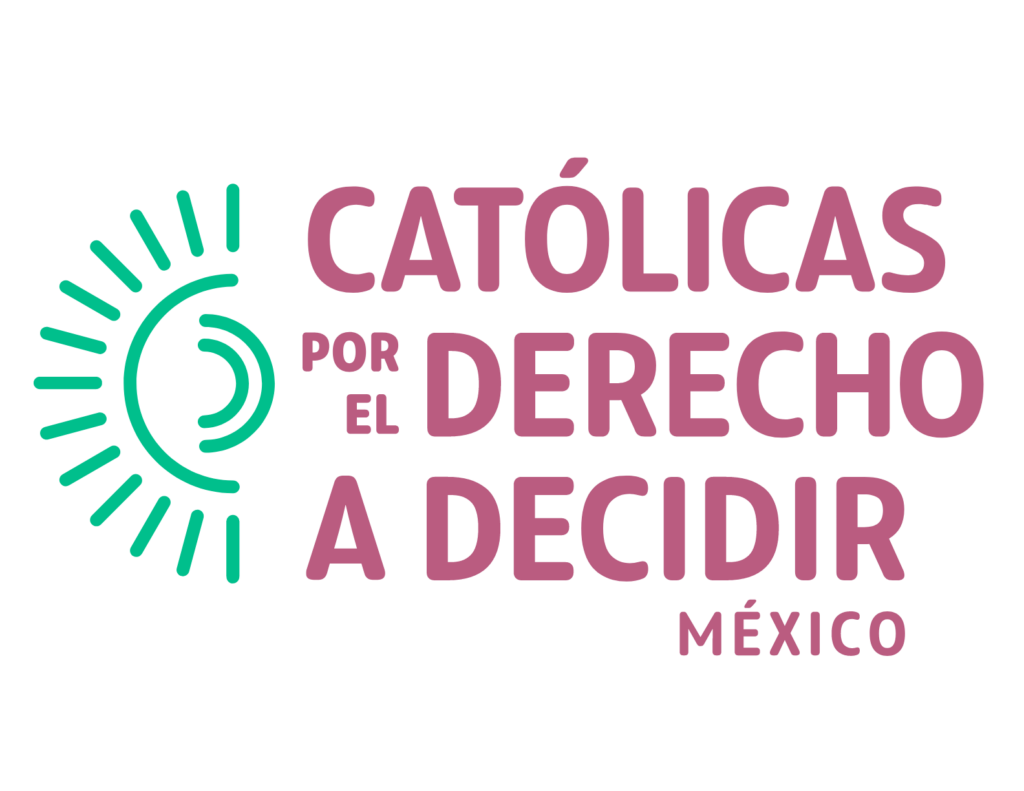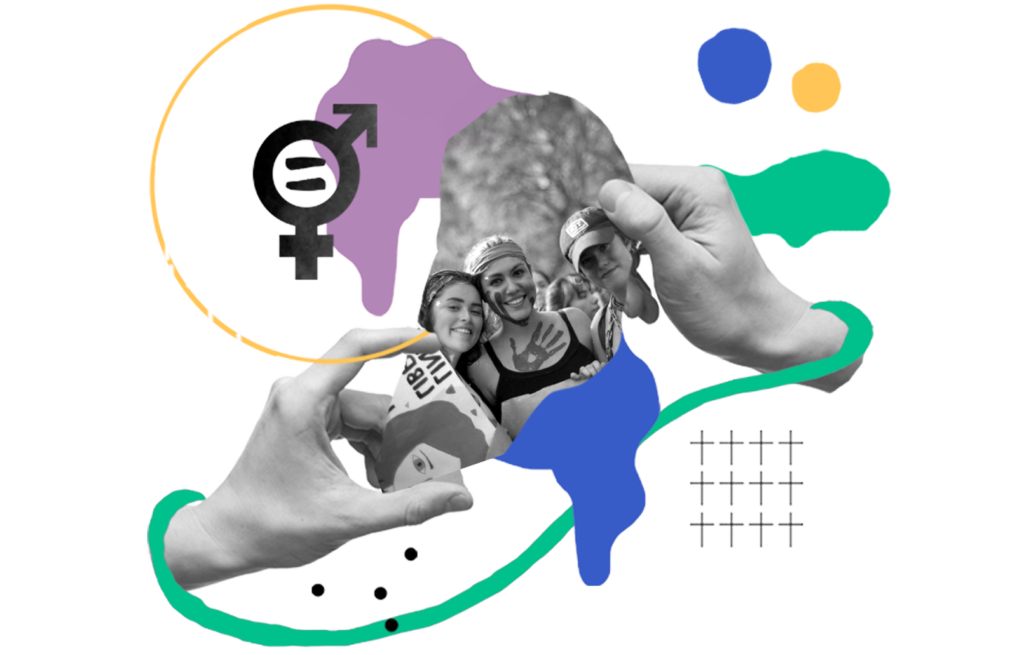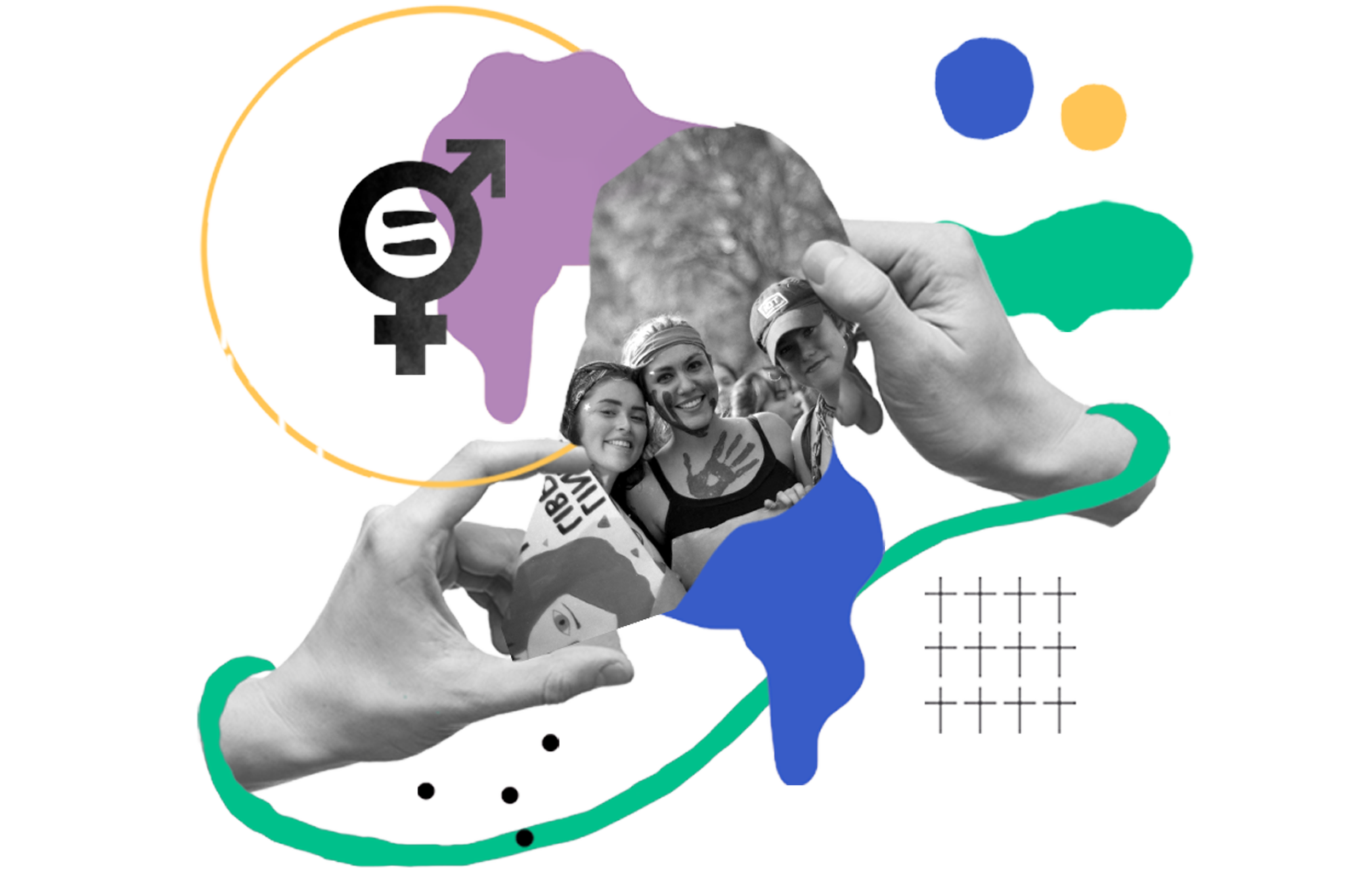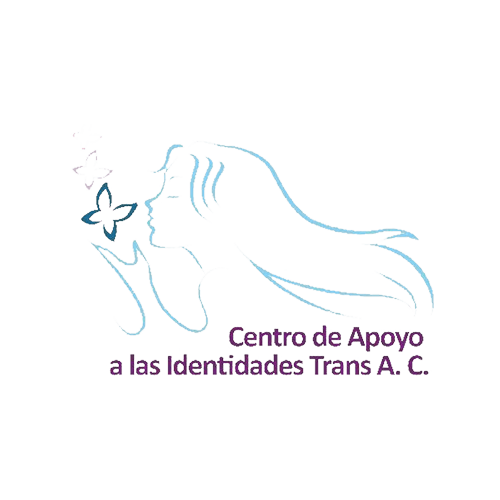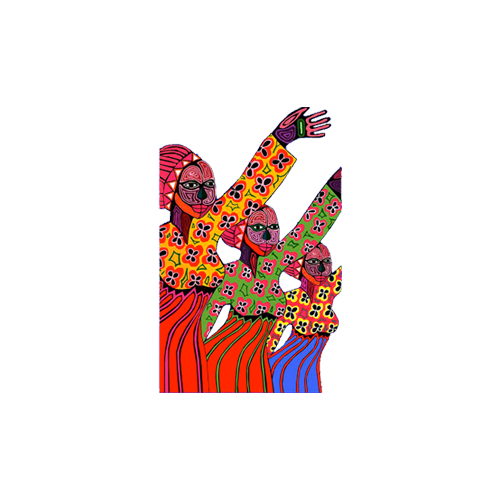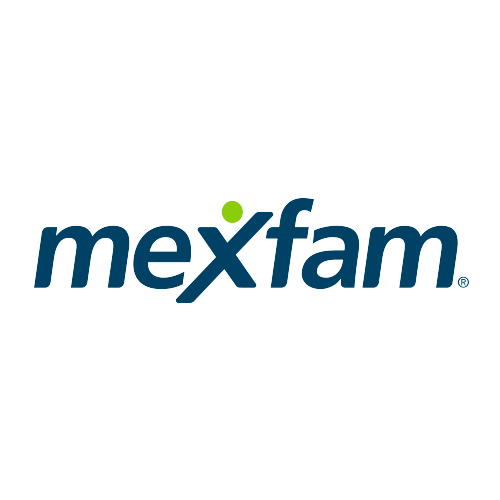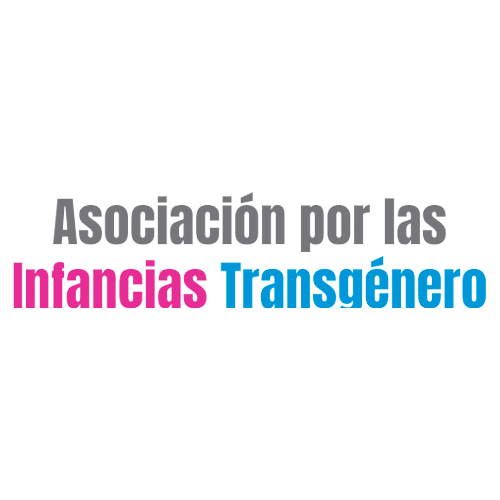Our Agenda
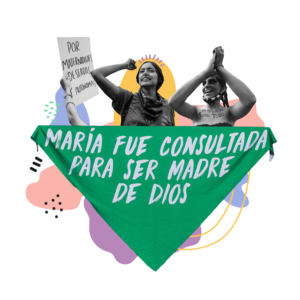
Desired motherhood
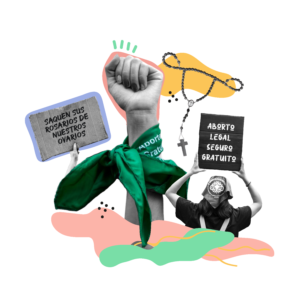
Sexual freedoms
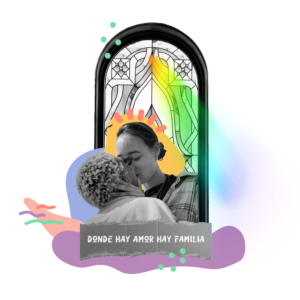
Sexual orientation, gender identity, and expression
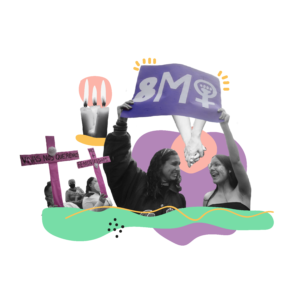
Life free from violence
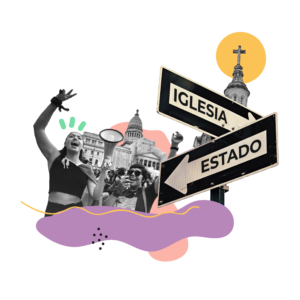
The secular State and religious pluralism
Our Strategies
1
We make visible and elevate the voices
of believers who promote freedom of conscience and the recognition of the moral capacity to make ethical decisions about our lives.
- Research and construction of narratives
- Social communication
2
We promote the implementation of public policies
and the modification of regulatory frameworks because we are convinced that the secular State must guarantee all human rights.
- Documentation
- Political relations
- Political communication
3
We build community
by betting on the transformative power of social organization and solidarity among peers, where people become agents of change through collective power.
- Group organization and collective action (common goals and concerns, building of networks and alliances)
- Awareness-raising and training of people who can influence their communities
- Support and accompaniment
Catholics for the Right to Decide
in Numbers
people reached with our informative materials
people reached through educational, informational, and awareness-raising activities on the various issues on our agenda, including activists, local leaders, and youth.
followers on social media
health professionals trained in sexual and reproductive rights, and conscientious objection
public officials and decision-makers who have been made aware of our arguments or trained in the various issues on our agenda
women who were provided with information or support to access a legal and safe abortion
press releases in national and international media that make our catholic and feminist arguments more visible
organizations and collectives with whom we have promoted joint actions
leaders in the field of religion and theology with whom we collaborate
produced episodes of our series Catolicadas and +9million reproductions on our social media
*Representative data from 2010 to 2022.
Our Achievements
We created the Latin-American Network of Catholics for the Right to Decide [Red Latinoamericana y del Caribe de Católicas por el Derecho a Decidir]
Together with other Catholics for the Right to Decide groups in the region, we founded the Latin-American Network of Catholics for the Right to Decide in 1994 as a regional effort to transform the cultural patterns that limit the autonomy of people, especially women.
We formed the National Alliance for the Right to Decide [Alianza Nacional por el Derecho a Decidir, ANDAR]
In 2002, Catholics for the Right to Decide, Gender Equality: Citizenship, Work and Family (Equidad), Information Group for Chosen Reproduction (GIRE), Ipas México and Population Council México formed the National Alliance for the Right to Decide (ANDAR, for its initials in Spanish), with the aim of improving the conditions for legal and safe abortion in Mexico.We received the Tenth “Don Sergio Méndez Arceo” National Human Rights Award
This recognition was awarded for our work defending sexual and reproductive rights as human rights, as well as for the promotion of gender equity.We published the book Human Rights Within the Church [Los Derechos Humanos al Interior de la Iglesia]
A year earlier, we held the seminar with the same name, which resulted in the book, as a contribution to the human rights movement in Mexico from an organization based on faith.We launched the first Catholic Opinion Survey [Encuesta de Opinión Católica]
In 2003 we launched the first Catholic Opinion Survey in Mexico, which identifies parishioners’ opinions on State secularism and sexual and reproductive rights and shows the way these diverge from those of the Catholic hierarchies. To date, the survey has been carried out again in 2009, 2014, and 2021.We created the National Catholic Youth Network for the Right to Decide [Red Nacional Católica de Jóvenes por el Derecho a Decidir]
This network was the seedbed for young people to raise their voices on the topics of sexuality, contraceptives, sexual diversity, and abortion. For 14 years, the Network actively promoted the monitoring of sexual and reproductive health services, promoted actions for awareness and education, and participated in inter-institutional spaces in 15 of the country's states.We contributed to the debate for the modification of Official Mexican Standard NOM 005
We were part of the diverse group of actors who pushed for the Emergency Contraceptive Pill to be included in the List of Essential Medicines of the Secretariat of Health.We contributed to the public debate on abortion rights in Mexico City
In 2007, Mexico City (then Federal District) was the first state to decriminalize abortion. Catholics for the Right to Decide contributed ethical and secular arguments to the public debate that accompanied the decriminalization and ratification of its constitutionality by the Nation’s Supreme Court of Justice (SCJN).We impulsed the creation of the National Citizens' Observatory on Femicide [Observatorio Ciudadano Nacional del Feminicidio (OCNF)]
Along with other allies, in 2007 we impulsed the creation of the National Citizens' Observatory on Femicide, to contribute to making justice accessible and eradicating femicidal violence.We launched our campaign entitled Love your neighbor as yourself, wear a condom
This initiative retrieves phrases from the Song of Solomon to promote a positive outlook on sexuality and the principle of the common good in HIV prevention. It was promoted within the framework of the 17th International AIDS Conference held in Mexico City.We received the Hermila Galindo Award
The Human Rights Commission of the Federal District (CDHDF) gave us this award in the category of civil organizations, for our outstanding work in the defense and promotion of sexual and reproductive rights.We promoted the Not all families are the same campaign
This initiative took place within the framework of the 6th World Meeting of Families, convened by Pope Benedict XVI in Mexico City. Through the message “Where there is love, there is family” we raised awareness about the diversity of families in our society.We launched the first A Different Catholic View on Abortion campaign
The aim was to communicate that, within our church, there are extenuating circumstances that consider the situations in which women have abortions, as well as to disseminate the views of our catholic tradition that recognize the moral authority of women to make decisions following the dictates of their conscience.We promoted the creation of Secular Republic [República Laica]
It is a plural and diverse grouping of organizations, progressive churches, political actors, opinion leaders, people in academia, and feminists, for the defense and strengthening of the secular state in Mexico.We took part in the public debate of legal reforms against pederasty
Sexual abuse of minors was categorized as a felony, protecting the best interest of children and teenagers. For the movement against ecclesiastic pederasty, this served as a basis for the sanctioning of offenders who assault minors, particularly priests who take advantage of their symbolic power and their position of authority.We supported the formation of Rapid Response Teams
The teams were formed in El Salvador, Guatemala, Nicaragua, and Costa Rica to respond collectively to threats and opportunities regarding the defense of sexual and reproductive rights in their countries.We contributed to the public debate that achieved the reform of constitutional art. 40 on the principle of secularism
The reform of constitutional article 40 elevated the secular nature of the state to constitutional status. With this reform, it was endorsed that, beyond the historical principle of separation, secularism is an essential condition to respond to the interests of citizens and democratic plurality.We launched Catolicadas
We launched Catolicadas, an animated series that takes a human rights and gender perspective, and uses humor to address stories of Catholic people facing conflicts or moral dilemmas, intending to erase stereotypes and social and religious fundamentalisms. The series has been very successful and has had a wide audience on both social media and national television.We published the book From the Gap to the Abyss. Catholic Bishops Addressing Parishioners in Mexico [De la brecha al abismo. Los obispos católicos ante la feligresía en México]
This book analyzes the positions and public statements of 111 bishops who made up the Conference of the Mexican Episcopate (CEM) in 2010, as well as the opinions and attitudes of the catholic parishioners regarding the topics of our agenda, to promote and enrich the public debate on the gaps between both instances.Led by the National Citizens' Observatory on Femicide, we contributed to the Supreme Court’s Sentence in the case of Mariana Lima Buendía
The Court unanimously determined that Mariana’s case, classified as suicide, was to be reopened and investigated as femicide. This ruling is paradigmatic because, in addition to issuing specific guidelines for Mariana's case, it generates important bases for the investigation of all cases of femicide or violent deaths of women.Led by the National Citizens' Observatory on Femicide, we contributed to the first declaration of a Gender Violence Alert in the State of Mexico
As a result of this alert, other declarations have been issued throughout the country, which have contributed to making violence against women more visible and placing it on the public agenda, as well as promoting accountability and the adoption of measures to respond and foster dialogue between key actors.We supported the creation of interreligious groups in Honduras and the Dominican Republic
After a process of ecumenical dialogue and training with religious leaders in Central America and the Caribbean, the organizations Ecuménicas por el Derecho a Decidir en Honduras [Ecumenicals for the Right to Decide] in Honduras and Alianza Cristiana de República Dominicana [Christian Alliance of the Dominican Republic] were formed. They have become progressive models of faith in favor of sexual and reproductive rights in each of their countries.We contributed to the modification of Official Mexican Standard NOM 046
As a result of this change, among other things, women who are victims of sexual violence do not need the permission of judicial authorities to be able to interrupt a pregnancy that results from rape.We created the Group of Spiritual Support [Grupo de Acompañamiento Espiritual]
This group, made up of religious leaders and ecumenical theologians, accompanies women in the decision to terminate a pregnancy, as well as people of sexual and gender diversities who have faced discrimination.We contributed to the debate for abortion rights in Oaxaca
We contributed ethical and secular arguments to the public debate and walked alongside collectives and groups in the process that led to the decriminalization of abortion in Oaxaca.We contributed to the debate for abortion rights in Hidalgo, Veracruz and Colima
During the process for the decriminalization of abortion in Hidalgo and Veracruz, as well as historically in the case of Colima, we contributed ethical and secular arguments to the public debate for the decriminalization of abortion in these entities, together with organizations, collectives, and Marea Verde.We created the Network of Ambassadors for Secularism [Red de Embajadores de la Laicidad]
We generated spaces for exchange and training, from which we facilitated the formation of a group of digital and civil society activists from 18 states who work for State secularism as a guarantee for the exercise of rights.Creamos de la Red Latinoamericana y del Caribe de Católicas por el Derecho a Decidir
Junto con grupos de Católicas por el Derecho a Decidir de la región, fundamos la Red Latinoamericana y del Caribe de Católicas por el Derecho a Decidir en 1994, como una apuesta regional para transformar los patrones culturales que limitan la autonomía de las personas, especialmente de las mujeres.
Formamos de la Alianza Nacional por el Derecho a Decidir (ANDAR)
En 2002 Católicas por el Derecho a Decidir, Equidad de Género: Ciudadanía, Trabajo y Familia (Equidad), Grupo de Información en Reproducción Elegida (GIRE), Ipas México y Population Council México, integramos la ANDAR, con el objetivo de mejorar las condiciones para el acceso al aborto legal y seguro en México.Recibimos el Décimo Premio Nacional de Derechos Humanos Don Sergio Méndez Arceo
Este reconocimiento fue otorgado por nuestro trabajo en defensa de los derechos sexuales y reproductivos como derechos humanos, así como por la promoción de la equidad de género.Publicamos el libro Los Derechos Humanos al Interior de la Iglesia
Un año antes llevamos a cabo el seminario del mismo nombre, del que resultó el libro, como una contribución al movimiento de derechos humanos en México como una organización basada en la fe.Lanzamos la primera Encuesta de Opinión Católica
En 2003 lanzamos la primera Encuesta de Opinión Católica en México, la cual identifica opiniones de la feligresía sobre la laicidad del estado y los derechos sexuales y reproductivos, y muestra la divergencia con aquellas de la jerarquía católica. A la fecha se ha vuelto a realizar en los años 2009, 2014 y 2021.Creamos la Red Nacional Católica de Jóvenes por el Derecho a Decidir
Esta Red fue el semillero para que jóvenes alzaran la voz en temas de sexualidad, métodos anticonceptivos, diversidad sexual y aborto. Durante 14 años, la Red promovió activamente el monitoreo de servicios de salud sexual y reproductiva, impulsó acciones de sensibilización y educación, y participó en espacios interinstitucionales en 15 estados del país.Contribuimos al debate para la modificación de la NOM 005
Formamos parte del grupo diverso de actores que impulsaron que la Pastilla de Anticoncepción de Emergencia se integrara al Cuadro Básico de Medicamentos de la Secretaría de Salud.Contribuimos al debate público por el derecho al aborto en la Ciudad de México
En 2007 la Ciudad de México (entonces Distrito Federal) fue el primer estado en despenalizar el aborto. Desde CDD, aportamos argumentos éticos y laicos al debate público que acompañó la despenalización y la ratificación de su constitucionalidad por parte de la Suprema Corte de Justicia de la Nación (SCJN).Impulsamos la creación del Observatorio Ciudadano Nacional del Feminicidio (OCNF)
Impulsamos, junto a otras organizaciones aliadas, la creación del Observatorio Ciudadano Nacional del Feminicidio en 2007, para contribuir a la erradicación de la violencia feminicida y el acceso a la justicia.Lanzamos la campaña Ama al prójimo como a ti mismo, usa condón
Esta iniciativa retoma frases del Cantar de los Cantares para promover una visión positiva de la sexualidad y el principio del bien común en la prevención del VIH. Se impulsó en el marco de la XVII Conferencia Internacional sobre el SIDA que tuvo lugar en la CDMX.Recibimos el Premio Hermila Galindo
La Comisión de Derechos Humanos del Distrito Federal (CDHDF) nos otorgó este reconocimiento en la categoría de organizaciones civiles, por nuestro destacado trabajo en la defensa y promoción de los derechos sexuales y reproductivos.Impulsamos la campaña
No todas las familias somos iguales
Esta iniciativa tuvo lugar en el marco del VI Encuentro Mundial de las Familias, convocado por el papa Benedicto XVI en la CDMX. Con el mensaje “Donde hay amor hay familia”, generamos conciencia sobre la diversidad de familias en nuestra sociedad.Lanzamos la primera campaña
Otra Mirada Católica al Aborto
Su objetivo fue socializar que existen en nuestra iglesia atenuantes que consideran las circunstancias en que las mujeres abortan, así como difundir posturas de nuestra tradición católica que reconocen la autoridad moral de las mujeres para tomar decisiones siguiendo los dictados de su conciencia.Impulsamos la creación de República Laica
Es una articulación plural y diversa de organizaciones, iglesias progresistas, actores políticos, líderes de opinión, personas de la academia y feministas, para la defensa y el fortalecimiento del estado laico en México.Participamos en el debate público de reformas legales contra la pederastia
Se tipificó el abuso sexual de menores como un delito grave, protegiendo el interés superior de niñas, niños y adolescentes. Para el movimiento contra la pederastia eclesial, fue una base para que se sancione a los delincuentes que agreden a los menores, en particular los sacerdotes que se aprovechan de su poder simbólico y de su investidura.Acompañamos la formación de Equipos de Respuesta Rápida
Los Equipos se formaron en El Salvador, Guatemala, Nicaragua y Costa Rica, para dar respuesta colectiva a amenazas y oportunidades para la defensa de los derechos sexuales y reproductivos en sus países.Contribuimos al debate público que logró la reforma del art. 40 constitucional sobre el principio de laicidad
La reforma al artículo 40 Constitucional elevó a rango constitucional el carácter laico del Estado. Con esta reforma, se refrendó que más allá del principio histórico de separación, la laicidad es una condición imprescindible para responder a los intereses de la ciudadanía y a la pluralidad democrática.Lanzamos Catolicadas
Presentamos Catolicadas, una serie animada que desde una perspectiva de derechos humanos y género, y utilizando el humor, aborda historias de personas católicas que enfrentan un conflicto o un dilema moral , con el objetivo de eliminar estereotipos y fundamentalismos sociales y religiosos. La serie ha sido muy exitosa con una amplia audiencia en redes sociales y televisión abierta.Publicamos el libro De la brecha al abismo. Los obispos católicos ante la feligresía en México
En este libro se analizan las posturas y declaraciones públicas de 111 obispos que integraban la Conferencia del Episcopado Mexicano (CEM) en 2010, así como las opiniones y actitudes de la feligresía católica en torno a temas de nuestra agenda, para promover y enriquecer el debate público sobre las brechas entre ambas.Con el liderazgo del OCNF, contribuimos a la Sentencia de la SCJN en el caso de Mariana Lima Buendía
La Corte determinó de forma unánime que el caso de Mariana, catalogado como suicidio, fuera reabierto e investigado como feminicidio. Esta sentencia es paradigmática porque, además de dictar lineamientos específicos para el caso de Mariana, genera bases importantes para la investigación de todos los casos de feminicidio o muertes violentas de mujeres.Con el liderazgo del OCNF, contribuimos a la primera declaratoria de Alerta de Violencia de Género en el Estado de México
A partir de esta alerta se han generado otras declaratorias a lo largo del país, que han contribuido a visibilizar la violencia contra las mujeres y a colocarla en la agenda pública; así como a promover la adopción de medidas para dar respuesta y fomentar la interlocución entre actores clave y la rendición de cuentas.Acompañamos la creación de grupos interreligiosos en Honduras y República Dominicana
Tras un proceso de diálogo ecuménico y formación con líderes religiosos de Centroamérica y el Caribe, se formaron las organizaciones Ecuménicas por el Derecho a Decidir en Honduras y la Alianza Cristiana de República Dominicana, que se han convertido en referentes progresistas desde la fe a favor de los derechos sexuales y reproductivos en sus países.Contribuimos a la modificación de la NOM 046
Gracias a este cambio, entre otras cosas, las mujeres víctimas de violencia sexual, no necesitan la autorización de la autoridad judicial para poder acceder a la interrupción de un embarazo, producto de una violación.Creamos el Grupo de Acompañamiento Espiritual
Este grupo, conformado por personas líderes religiosas y teólogas ecuménicas, acompaña a mujeres en la decisión de interrumpir un embarazo, así como a personas de la diversidad sexo-genérica que enfrentan discriminación.Contribuimos al debate por el derecho al aborto en Oaxaca
Aportamos argumentos éticos y laicos al debate público, y acompañamos a colectivas y grupos en el proceso que logró la despenalización del aborto en Oaxaca.Contribuimos al debate por el derecho al aborto en Hidalgo, Veracruz y Colima
Durante el proceso para la despenalización del aborto en Hidalgo y Veracruz, así como históricamente en el caso de Colima, aportamos argumentos éticos y laicos al debate público para la despenalización del aborto en estas entidades, junto con organizaciones, colectivas y la marea verde.Creamos la Red de Embajadores de la Laicidad
Generamos espacios de intercambio y formación, a partir de los cuales facilitamos la conformación de un grupo de activistas digitales y de la sociedad civil de 18 estados que trabajan por la laicidad del Estado como garantía para el ejercicio de derechos.Networks and Alliances
We are part of:
Group of organizations integrated by Catholics committed to the search for social justice and the change of cultural and religious patterns present in our society. From this network, we carry out joint actions to achieve a greater impact and incidence in the region in favor of the defense of women’s human rights.
https://redcatolicas.org
Since 2002, Catholics for the Right to Decide, Gender Equity: Citizenship, Work and Family (Equidad de Género: Ciudadanía, Trabajo y Familia, Equidad), Information Group for Chosen Reproduction (Grupo de Información en Reproducción Elegida, GIRE), Ipas México, and Population Council, México make up the National Alliance for the Right to Decide (ANDAR), with the goal of strengthening women’s sexual and reproductive rights in Mexico, as well as improving conditions for access to safe and legal abortions. We collaborate with leading organizations in the field of sexual and reproductive rights, each from a different perspective.
https://andar.org.mx
Mira que te Miro is a regional initiative for social monitoring of the commitments adopted in the Montevideo Consensus by the Regional Conference on Population and Development in Latin America and the Caribbean, held in 2013 in Uruguay. It contributes to strengthen accountability, transparency, and access to information on policies, programs, and services that account for the materialization of the commitments made by the States in this new agenda that represents for the region the projection of the commitments made in the Program of Action of the International Conference on Population and Development (ICPD) in Cairo in 1994 and its subsequent review processes.
It monitors, analyzes, and compares legislation; policies and strategies; programs and national and regional statistical information about the following components included in the Montevideo Consensus: human rights and secularism, comprehensive sexuality education, universal access to sexual and reproductive health, and accountability.
https://www.miraquetemiro.org
National network formed by 43 organizations from different states that is responsible for monitoring, systematizing information, and documenting cases of femicide to facilitate the design of laws and public policies on human rights with a gender perspective. The areas of work include legal support to family members of femicide victims, documentation of cases of femicide in different states of the country, advocacy for the effective implementation of the General Law on Women’s Access to a Life Free of Violence, visibility of cases of femicide and generation of public opinion in favor of women’s right to a life free of violence.
https://www.observatoriofeminicidiomexico.org/quienes-somos
Association in which 86 human rights organizations from all over Mexico converge to elaborate strategies that guarantee the effectiveness in the defense and promotion of human rights for all individuals. Its goal is to achieve an integral defense of human rights; they understand human rights from a broad and inclusive perspective.
https://redtdt.org.mx
https://www.facebook.com/PorUnaRepublicaLaica/about
This feminist movement was created in 2012 by 21 organizations to push forward public policies for gender equality in Mexico City. Through dialogue with decision-makers over the last few years, this organism has presented an agenda on equality with proposals on gender institutionalization, budgets for equality, access to justice for women, sexual rights and reproductive rights, construction of citizenship and political rights for women, as well as a culture of equality in the city aimed at the local executive and legislative sectors.
https://twitter.com/cdfeminista
https://www.facebook.com/CiudadFeminista/?ref=page_internal
The Gender and COVID-19 Observatory in Mexico is, on the one hand, an exercise of social control so that the actions that the State implements in order to face the pandemic comply with human rights obligations, from a gender and intersectionality perspective and, on the other hand, an initiative that shows the contributions of civil society for the creation of futures, where equality and justice are in the framework of action in the new normal.
https://genero-covid19.gire.org.mx
The Observatory of the Universality of Rights (OURs) is a collaborative project that seeks to monitor, analyze, share information and generate joint advocacy actions to respond to efforts and movements that use supposed arguments related to religion, culture, and tradition to obstruct and deny human rights. The project brings together a diversity of regions and topics to bring social justice forward.
https://www.oursplatform.org
CLACAI is a network of activists, researchers, health care providers, and professionals that contributes to the reduction of unsafe abortion in Latin America. It promotes access to information, and to modern and safe technologies within the framework of full respect for sexual and reproductive rights, from a gender and equity perspective.
https://clacai.org
We collaborate with:
Our Community
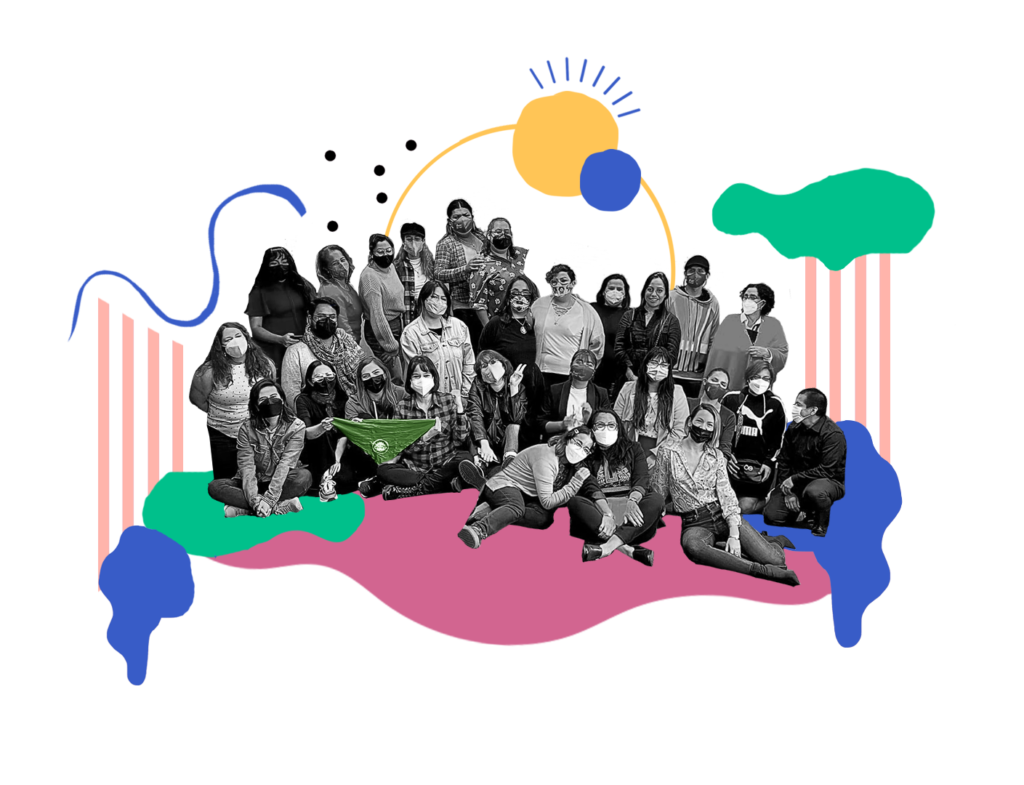
Ambassadors for Secularism
Ambassadors for Secularism is a network created by Catholics for the Right to Decide to defend the secular State through broad collaboration and to publicly position ourselves in the face of violations of this fundamental principle. This network includes human rights activists, public officials, academics and influencers, content creators, and digital activists, all conscious and aware in regards to this issue.

Spiritual Support Group
It is an ecumenical theological team composed of people from different religious denominations that provide spiritual accompaniment to women who are facing the decision to end their pregnancy or who have done it, and, more recently, to people from the LGBTIQA+ community, who have been discriminated against. Our theological work is linked to some aspects of spiritual discernment, such as reflections on the termination of a pregnancy and faith-based mediation.
© COPYRIGHT, CATHOLICS FOR THE RIGHT TO DECIDE, 2024.

